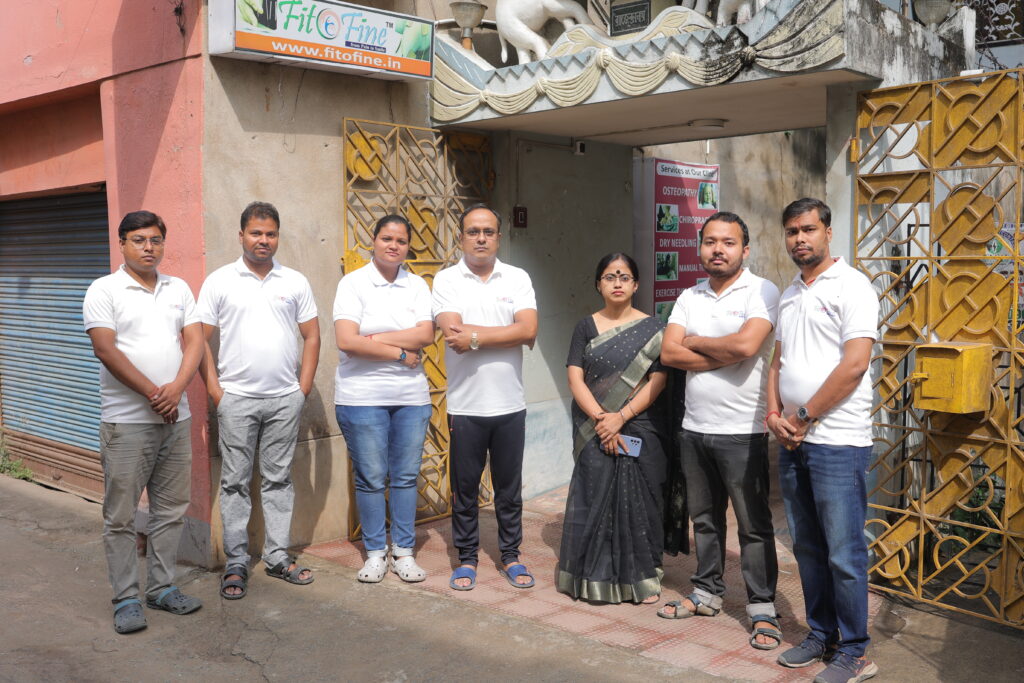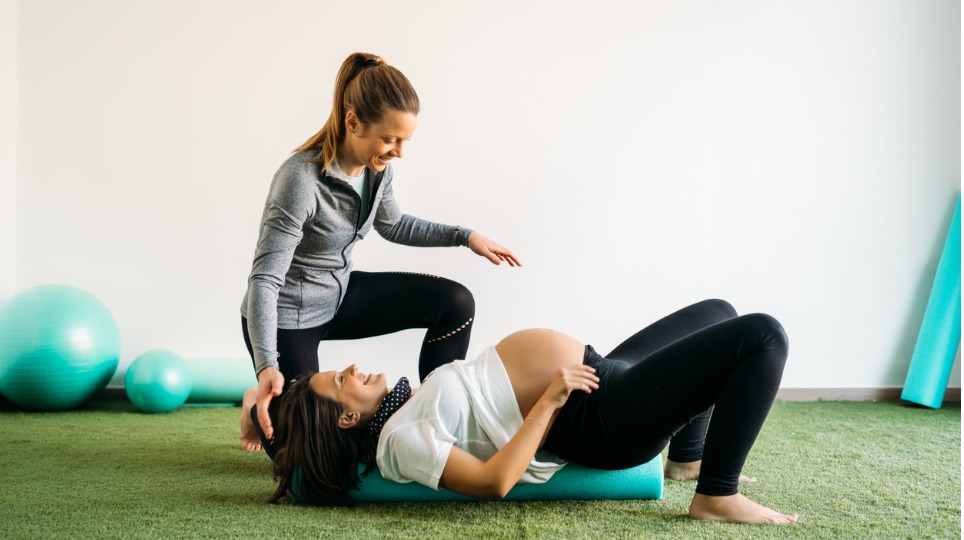Prenatal and Postnatal Physiotherapy: Support for Moms
From growing a baby to delivering one and then taking care of them 24/7, a woman’s body undergoes remarkable changes. While the world celebrates the joy of motherhood, the aches, fatigue, and recovery are often quietly endured.
At FitoFine Physiotherapy Clinic, we’re here to change that.
Our specialized prenatal and postnatal physiotherapy services are designed to help expectant and new moms feel supported, understood, and stronger, both physically and emotionally.

What Is Prenatal and Postnatal Physiotherapy?
Prenatal physiotherapy supports your body during pregnancy, relieving discomfort, promoting safe exercise, and preparing your muscles and joints for childbirth.
Postnatal physiotherapy, on the other hand, focuses on healing and rebuilding strength after delivery, especially if you’re facing issues like pelvic pain, urinary incontinence, or abdominal separation (diastasis recti).
Whether you had a normal delivery or a C-section, our care is customized to your journey.

Pregnancy and childbirth are associated with significant anatomical, physiological, and biomechanical changes. While these changes are natural and essential, they often create challenges such as musculoskeletal pain, pelvic dysfunction, and impaired mobility. Postnatally, women may face additional complications including diastasis recti abdominis (DRA), pelvic floor weakness, and postural adaptations. Physiotherapy, with its evidence-based strategies, plays a critical role in minimizing these complications, enhancing functional recovery, and supporting overall maternal health.
Physiological Changes and Their Implications
During pregnancy, hormonal influences such as relaxin lead to increased ligamentous laxity, altering joint stability and biomechanics. The growing uterus shifts the center of gravity, often resulting in postural adaptations like lumbar lordosis and pelvic tilt. These changes can place additional stress on the lumbar spine and pelvic girdle, causing pain and discomfort. After delivery, particularly following cesarean sections or complicated labors, musculoskeletal and functional impairments may persist if not addressed promptly.
Prenatal Physiotherapy: Why It Matters
During pregnancy, your body undergoes hormonal changes, increased joint mobility, and a shift in posture due to your growing baby bump. These often lead to:
- Lower back or hip pain
- Sciatica or nerve pressure
- Pelvic girdle instability
- Swollen feet, leg cramps
- Posture-related neck or shoulder strain
Our prenatal physiotherapy can help you by:
Teaching safe, low-impact exercises
Easing muscle tension with gentle massage
Improving posture and movement alignment
Strengthening pelvic floor muscles
Helping you manage stress with breathing techniques
Preparing your body for smoother labor

Key Areas Where Physiotherapy Intervenes
1. Pain Management and Mobility
Pregnancy-related low back pain and pelvic girdle pain are among the most common complaints. Physiotherapists employ manual therapy, therapeutic exercise, and modalities such as heat or electrotherapy to alleviate pain. Guided mobility programs ensure that women remain active while minimizing the risk of injury or overstrain.
2. Pelvic Floor Rehabilitation
The pelvic floor muscles undergo immense stress during pregnancy and childbirth, often resulting in weakness or injury. This can manifest as urinary incontinence, prolapse, or reduced core stability. Physiotherapy focuses on pelvic floor muscle training (PFMT), using evidence-based protocols such as Kegel exercises, biofeedback, and progressive resistance training. Strengthening these muscles not only improves continence but also contributes to spinal and pelvic stability.
3. Management of Diastasis Recti Abdominis (DRA)
DRA, defined as the separation of the rectus abdominis muscles along the linea alba, is a common postpartum condition. If unaddressed, it can lead to core instability, altered trunk mechanics, and persistent back pain. Physiotherapists prescribe targeted abdominal exercises, focusing on transverse abdominis activation, progressive core strengthening, and functional retraining. Research indicates that structured physiotherapy interventions significantly reduce inter-recti distance and improve abdominal function.
4. Functional Strength and Re-Education
Immobilization, hormonal effects, and altered movement patterns contribute to muscle weakness and atrophy. Physiotherapy introduces tailored strengthening programs, including resistance training, balance exercises, and functional movements. These are designed to restore stability, coordination, and overall physical resilience—key elements for returning to daily activities and safe childcare.
5. Post-Surgical and Scar Management
For women undergoing cesarean sections or surgical interventions, physiotherapy addresses scar tissue mobility and postural adaptations. Scar massage, stretching, and specialized taping techniques help improve tissue flexibility, reduce adhesions, and enhance functional recovery.
6. Complication Prevention
Physiotherapy plays a preventive role in reducing the risk of venous thromboembolism, pressure sores, and respiratory issues post-surgery or prolonged bed rest. Breathing exercises, mobility training, and circulation-enhancing activities are integral components of the rehabilitation program.
7. Patient Education and Empowerment
Beyond physical interventions, physiotherapists provide essential education on posture, ergonomics, safe lifting, breastfeeding positions, and lifestyle modifications. This empowers women with the knowledge to self-manage symptoms and maintain long-term health benefits.
Postnatal Physiotherapy: Gentle Recovery for New Moms
After childbirth, especially within the first 6-12 weeks, your body deserves focused healing. Many moms face challenges like:
- Pelvic or back pain
- Incontinence or urine leakage
- Abdominal separation (diastasis recti)
- C-section or perineal scar discomfort
- Poor posture from breastfeeding or baby care
With postnatal physiotherapy, we focus on:
Core and pelvic muscle strengthening
Pain relief for joints, scars, or stitches
Realignment and posture correction
Breathing, energy management, and emotional support
Safe reintroduction to daily activities and exercise

Evidence Supporting Physiotherapy in Maternal Health
Clinical research consistently highlights the effectiveness of physiotherapy in improving postnatal outcomes. Studies report significant reductions in pain scores, faster return of functional mobility, and lower prevalence of incontinence among women receiving structured physiotherapy programs compared to controls. Early intervention is particularly emphasized, as delayed rehabilitation can prolong dysfunction and increase the risk of chronic conditions.
For example, randomized controlled trials demonstrate that women engaging in pelvic floor muscle training during and after pregnancy experience up to a 50% reduction in urinary incontinence rates. Similarly, structured exercise programs targeting DRA show measurable improvements in abdominal function within 8–12 weeks.
Holistic Impact on Quality of Life
The role of physiotherapy extends beyond physical recovery. By addressing pain, dysfunction, and body image concerns, physiotherapy contributes positively to psychological well-being. Women often report increased confidence, improved emotional health, and greater autonomy when actively engaged in rehabilitation. This holistic benefit is particularly valuable during the transition to motherhood, when physical and emotional demands are high.our first baby or your third, your recovery matters, and we’re with you every step of the way.
Safe & Effective Exercises for Moms
Physiotherapy is an essential component of prenatal and postnatal care, addressing the unique physical challenges associated with pregnancy and childbirth. Through targeted interventions—ranging from pain relief and pelvic floor rehabilitation to scar management and functional retraining—physiotherapists support women in regaining mobility, strength, and independence. Importantly, personalized and early interventions yield the best outcomes, reducing complications and enhancing quality of life.
For healthcare providers, integrating physiotherapy into routine maternal care is not optional but fundamental. Ensuring women have timely access to physiotherapy services can significantly improve both short-term recovery and long-term health outcomes.
Why Every Mom Needs Prenatal and Postnatal Physiotherapy
Many women assume physiotherapy is only for when something goes wrong, but it’s actually a preventive and empowering tool that offers benefits to every mom.
Here’s what it can do for you:
- Prevent injury or strain during and after pregnancy
- Promote faster and smoother recovery
- Help you reconnect with your body
- Support mental health and reduce anxiety
- Give you strength and confidence for your new role as a mother
Frequently Asked Questions (FAQs)
Q1. When should I begin prenatal physiotherapy?
You can start as early as the second trimester. Always check with your OB-GYN before beginning any therapy.
Q2. Is postnatal physiotherapy safe after a C-section?
Yes, with medical clearance (usually after 6–8 weeks), it’s extremely helpful in managing scar discomfort, posture, and regaining core strength.
Q3. Can physiotherapy help with incontinence?
Absolutely. Pelvic floor rehab is one of the best non-surgical treatments for postpartum urinary leakage.
Q4. How many sessions will I need?
This depends on your body, condition, and recovery goals. Some moms may feel better in a few sessions; others benefit from ongoing care over weeks or months.
Q5. Can I bring my baby with me?
Yes! We maintain a warm, supportive space for both moms and babies. You’re welcome to bring your little one along.
Why FitoFine is the Best Choice for Women’s Physiotherapy
At FitoFine, we’re more than a physiotherapy clinic, we’re your support system during one of life’s most beautiful (and demanding) phases.

Book Your Session Today
Whether you’re preparing for childbirth or recovering from it, you deserve care that empowers you. At FitoFine Physiotherapy Clinic, we help you feel stronger, pain-free, and more in control of your health.
Clinic Hours:
Mon to Sat: 5:00 PM – 10:00 PM
Sunday: Closed
Call/WhatsApp: +91 6295115701
Email: fitofine.in@gmail.com
Website: www.fitofine.com
FitoFine: Where Your Strength Meets Support. One Step at a Time.



